Orientation Day
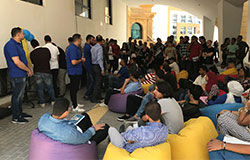
It was a special day for new freshmen students to let them know about more about the departments of Faculty of Engineering & Technology.
We introduced PE Deptartment to them and our FUE SPE SC, abbreviations stand for activities and future plan
Recruiting Event
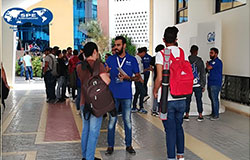
At the beginning of the current academic year and with conjunction with the establishment of our chapter we decided to assemble a recruitment event for students from all of the university’s faculties and join the committees in our chapter to take advantage of the technical and non-technical activities provided by SPE.
Future Energy Africa 2018
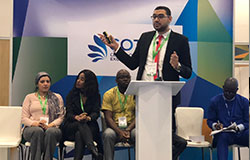
Future Energy Africa was held from October 1 to 3, 2018. Our President Ahmed Farag participated in the Conference Future Energy Africa in Cape Town in South Africa. He presented his paper “New Potential of Unconventional Oil and Gas Resources in Egypt.”
Charity Event
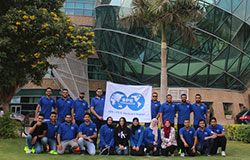
From the standpoint of community service and development our chapter made a charity visit to Children’s Cancer Hospital 53753.
Technical Event
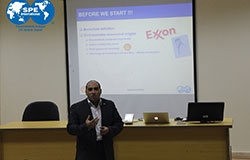
On November 4, 2018 our first technical event was held in-collaboration with the ambassador lecture of program of SPE-YP. The event “Well Design Optimization in Brownfields” was hosted by FUE and presented by Engineer Mohamed Moktar Eltrissi.
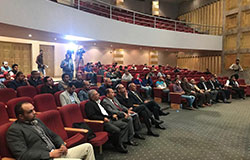
FUE in-cooperation with FUE SPE Student Chapter hosted the SPE monthly meeting on November 18, 2018.
The meeting was about “Artificial Lift Systems” presented by Dr. Ghareeb Hamada.
Abu Dhabi International Petroleum Exhibition and Conference (ADIPEC)
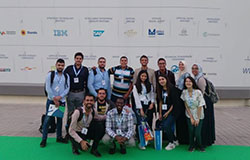
University Program
SPE FUE SC nominated four students (Jomana, Ahmed Naguib, Mohamed Ashrf and Abdelrahman Zaree) to be one of the two Egyptian teams that participated in Abu Dhabi International Petroleum Exhibition and Conference “University Program” from 11th November to 13th November. The team received and worked on a project about Crude Oil to Chemicals (COTC).
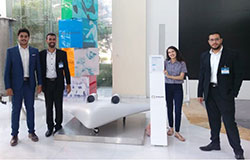
Program Agenda
This 3-day program took place during the dates of ADIPEC. Below is an example of a 3-day program:
Day 1 – Professional Development, Networking and Field Trip.
Day 2 – Professional Development, Networking and ADIPEC visit.
Day 3 – Final Presentations, Judging & Awards: On the last day of the program, our students presented to a group of judges and their peers.
Day 4 (TBC) – Special Opportunity for top three teams (Canceled by SPE International).
SPE Egypt Produced Water Management Workshop Qarun Field (January 2019)
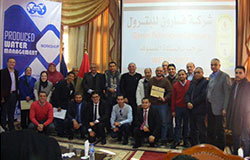
Summary:
The workshop started with a welcoming word from Qarun Chairman and Managing Director Eng. Ashraf Abdelgawd, followed by the opening speech from Dr. Ismail Mahgoub on behalf of Eng. Mohamed Mounes, the workshop chair.
A brief introduction was introduced about SPE Activities in Egypt, followed by 8 technical presentations from Qarun, Petrodara, Gupco, Khalda, Bapetco, Schlumberger and Advantek, with the following titles:
| S
|
Speaker Name
|
Company
|
Presentation Title
|
| 1
|
Eslam Hamed
|
Qarun
|
Water Flooding Using Produced Water, Challenges and Opportunities
|
| 2
|
Ibrahim Hassan
|
Qarun
|
The Management of the Produced Water by Chemical Treatment for Reuse by Injection at Water Flood
|
| 3
|
Ahmed Gamal
|
Petro Dara
|
Produced Water Management West Bakr, Petro Dara & North West Gharib Co.
|
| 4
|
Mostafa Mamdouh
|
Gupco
|
Produced Water Management at Gulf of Suez
|
| 5
|
Mahmed Ghallab
|
Khalda
|
Impact of Produced Water Re-injection on Production
|
| 6
|
Ashraf Abdelsattar
|
Bapetco
|
BAPETCO Water Disposal Techniques: Water Disposal Wells & Evaporation Ponds
|
| 7
|
1-Hatem Darwish
2-Maria Leticia
3-Tarek Medhat
|
SLB
|
1. Challenge Identification (produced water)
2. Mechanical Water shut off (avoidance)
3. Produced Water Treatment (handling)
|
| 8
|
Mahmoud Shams
|
Advantek
|
Produced Water Management Strategy and Water Injection Best Practices
|
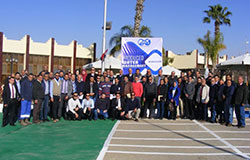
Conclusions and Recommendations:
The workshop’s committee summarized the following conclusions and final recommendation.
1- Managing the produced water is an essential and vital subject on the oil and gas industry due to the negative environmental impact of produced water, and cost related to treatment and management implications.
2- Managing the produced water starts from the reservoir through performing reservoir studies in addition to differentiate between Bad water versus Good water. Different water shut off techniques could be implemented to isolate bad water. Shutting the water off at reservoir side can reduce the cost of treatment and handling costs, and it will reduce the corrosion events and the impact of produced water on the assets of the company
(Corrosion, Scale, etc.).
3- Produced water can be managed at surface by surface facilities, and water can be stored in evaporation pits. The option of storing the water in evaporation pit sometime is not considered as practical option especially with high volumes of produced water due to the large foot print required for evaporation pits, and the environmental impact especially with slow rate of evaporation, or leakage to underground water.
4- Evaporation pits specifications shall be clearly identified and unified on all oil and gas companies in Egypt (pits lining specs, materials for lining, the isolation form sounding environment, the regular tests required to be carried, etc.) Also, environmental studies from authorized governmental parties shall be performed before start of any project for water disposal through evaporation pit or by any other mean.
5- Water disposal to the water ways and sea shall be carried with very restricted environmental control due to the negative impact of produced water on Aquatec environment and water pollution.
6- Produced water re-injection is one of the applied methods to manage the produced water, as this water can be utilized to maintain reservoir pressure beside the conventional water injection techniques.
7- Water quality testes and core tests studies shall be performed on produced water in order to identify the minim requirements for produced water mechanical and chemical treatment.
8- One of the major problems generated as a result of utilizing produced water for re-injection is the reservoir souring, as the H2S level increases with the produced fluids due to action of SRB Bacteria. Reservoir souring has a negative impact of the production due to reservoir damage, also it affect negatively the assets of the company due to increase of corrosion and material failure events and biofouling, plugging events of surface facilities.
9- Some companies highlighted the application of utilizing abundant formations for water disposal, and it is recommended to perform reservoir studies to identify the potential water disposal formation in each area of activity.
10- GRE lined tubing and pipelines can be utilizing to minimize the impact of corrosion due to water in the produced fluids.
11- Some reservoir fluids contain some extent of radioactivity, close monitoring of radiation in the surface evaporation pits shall be carried on regular basis.
12- Fractured injection is one of the successful methods utilized to avoid pressure build up due to reservoir plugging.
Finally, the workshop committee recognized the host company, all speakers, and appreciated the efforts and contribution of all attendees.
SPE International Heavy Oil Conference and Exhibition December 2018
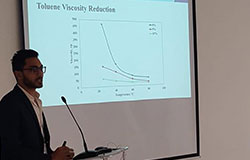
During 10-12 December our distinguished member Ehab Wanas participated in the Conference SPE International Heavy Oil in Kuwait. He published his paper "Investigating the Viscosity Reduction of Ultra Heavy Crude Oil Using Hydrocarbon Soluble Low Molecular Weight Compounds to Improve Oil Production and Transportation".
You can find it on SPE onepetro with the code: SPE-193677-MS
Schlumberger Visit
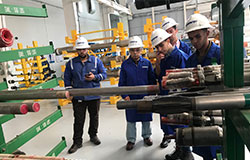
On November 24, 2018 our department made a visit to the Egypt Centre of Efficiency Schlumberger. The visit included lectures and tools description bit types, formation evaluation tools, LWD tools …
Schlumberger's Visit to FUE
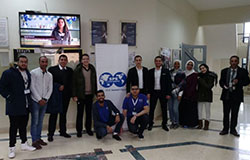
On 6th of February 2019, SLB visited FUE’s campus to shoot their movie. They had an interview with the professors and filmed another part in open area in the campus.
"Unconventional Well Performance” Seminar February 2019
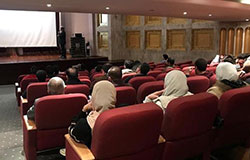
SPE FUE SC had a great opportunity to receive Egyptian/American Scientist Dr. Mazher Ibrahim for Seminar in our university about unconventional reservoir.
Dr. Mazher Ibrahim is currently working for Apache Corporation America as a Senior Advisor Reservoir Engineer for unconventional reservoir. He has 23 years of experience of working in petroleum engineering discipline that includes field experience and various advisory roles.
Mazher’s working experience includes several years with BP America as Senior Reservoir Engineer for unconventional Flagship, three year with EOG Resources as a Staff Reservoir Engineer, three years with BP Egypt as Senior Reservoir/Petroleum Engineer and one year with El-Paso Energy, Houston, TX, USA. Also, He has 10 years of teaching experience at Texas A&M University and (Egypt University, you mean Cairo Uni?).
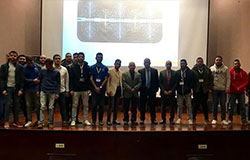
Abstract
Unconventional reservoirs become main source of production in most country after the success of hydraulic fracture with horizontal well drilling.
These well it cost a lot of money from drilling to completion starting from $4 to $20 million. Also, the production of unconventional reservoir is equivalent to mining production which need to drill more wells compared with conventional reservoir.
So, the main challenge in unconventional reservoir is to calculate the exact number of well needed to be drilled with less cost and high net profit.
There are many tools use currently to calculate unconventional well performance and estimate the ultimate recovery like RTA, reservoir simulation and decline curve.
The goal from this talk to go through these tools with assumptions and limitation of each methods.
SPE OnePetro
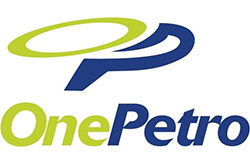
Believing in developing skills of our PE students, we managed to get subscription to SPE OnePetro to download research papers and get to know latest oil and gas technology.
